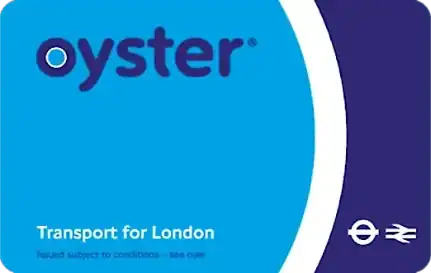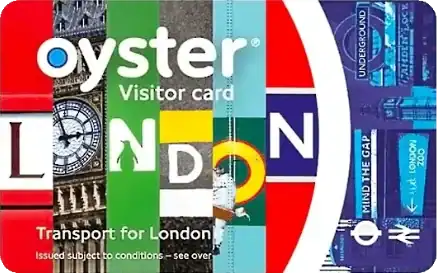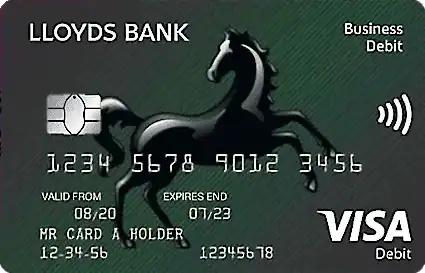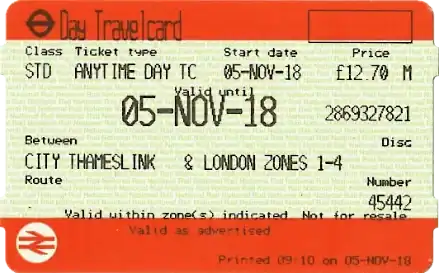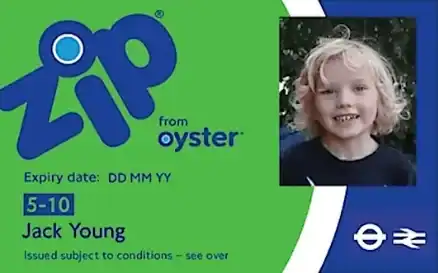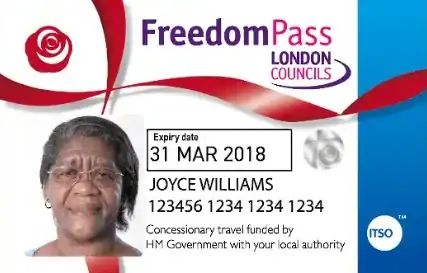The Royal Mews is a working stables attached to the back of Buckingham Palace, with rooms for all the grooms, coachman and chauffeurs who work on the King’s horses, carriages and cars.
Richard II’s original Mews at Charing Cross
Richard II was more interested in his hawks than his horses so that’s why it he called it the Mews (mews means moulting). He built it at the top end of Whitehall Palace which once stretched all the way from Admiralty Arch past Banqueting House and Downing Street.
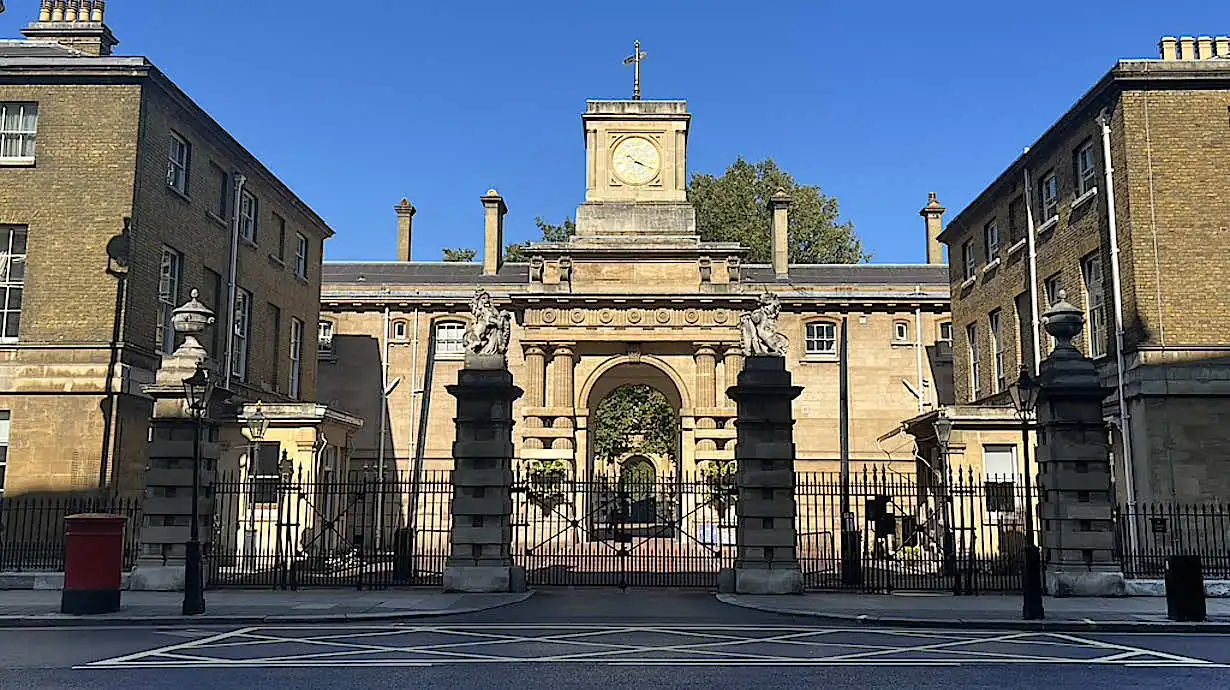 Photo: londondrum.com
Photo: londondrum.comWhen George III bought Buckingham House he started moving the horses over there and when George IV converted it into a palace he transferred all of the coaches as well. The old Mews was then knocked down to make way for Trafalgar Square and the National Gallery.
Windsor Grey & Cleveland Bay horses
After you’ve made your way through security and picked up your headphones you’re straight into the stables and a strong smell of horses. If you’re lucky then you might see a few of them being trotted around the interior quadrangle but most of the time it seems to double up as a staff car park for all the flats and balconies around the top.
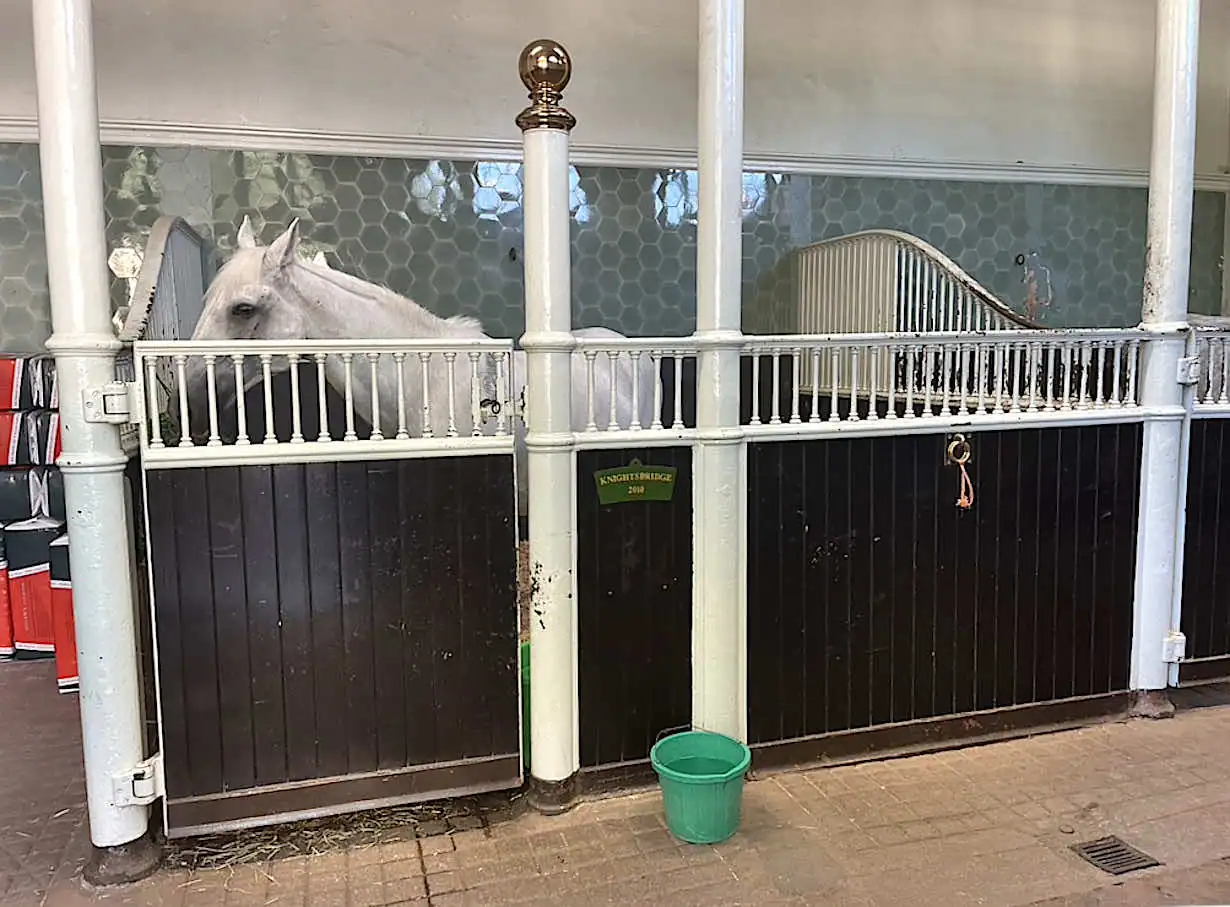 Photo: londondrum.com
Photo: londondrum.comThe monarch has two types of horses at the Mews: Windsor Greys and Cleveland Bays. Windsor Greys get all the plum jobs carrying the King and Queen, Prince and Princesses, and Duke and Duchesses during the big parades.
Cleveland Bays get lumbered with the day-to-day duties and other ceremonial roles. If you don’t mind getting up early then you can usually see a few of them leaving the Mews at 6 AM for their early morning ride around Hyde Park or St. James’s Park.
You might also see them delivering the post between Buckingham Palace and St. James’s Palace. (This antiquated practice has been going on since at least 1843, and is supposed to help train them in the art of pulling carriages.) If you ever see them carrying a passenger up The Mall then they’ll probably be taking a newly appointed ambassador to the palace to present their credentials to the King.
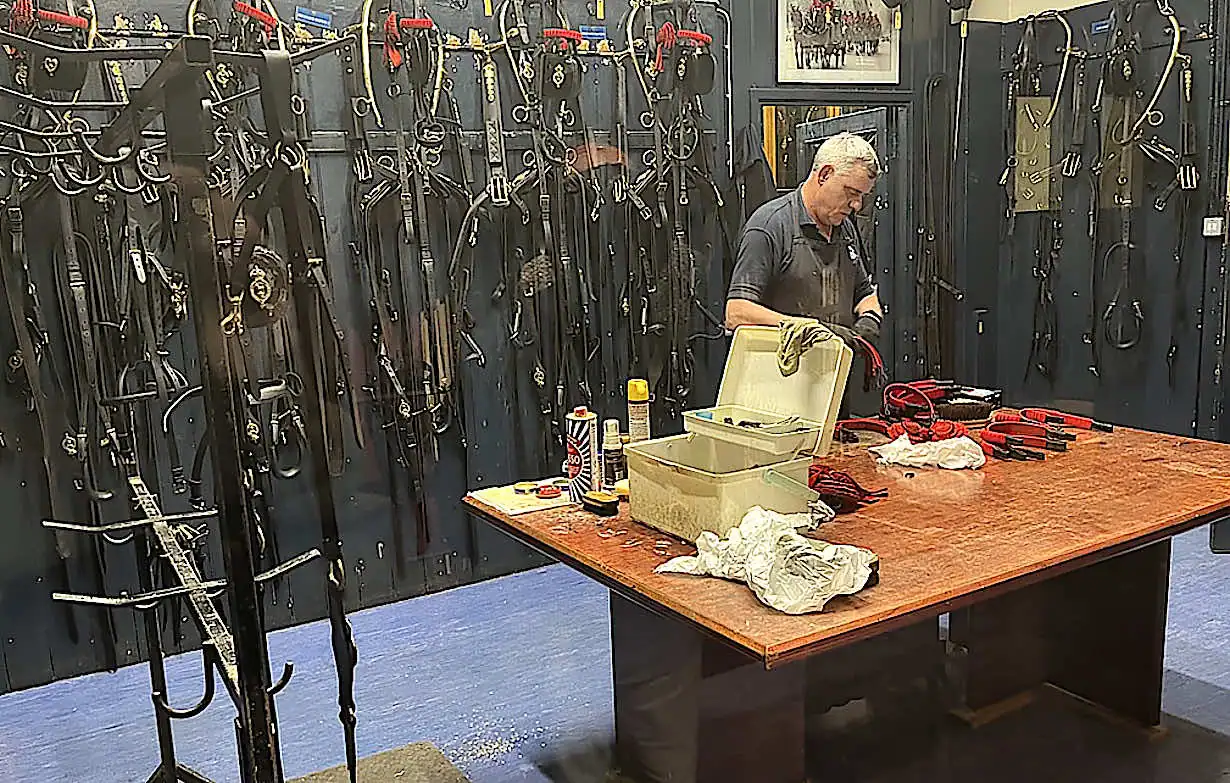 Photo: londondrum.com
Photo: londondrum.comJust after the stables you can peer into a big window and watch somebody polishing hundreds of buckles and belts with a big bottle of Brasso.
Landau carriages, sledges, sleighs and charabancs
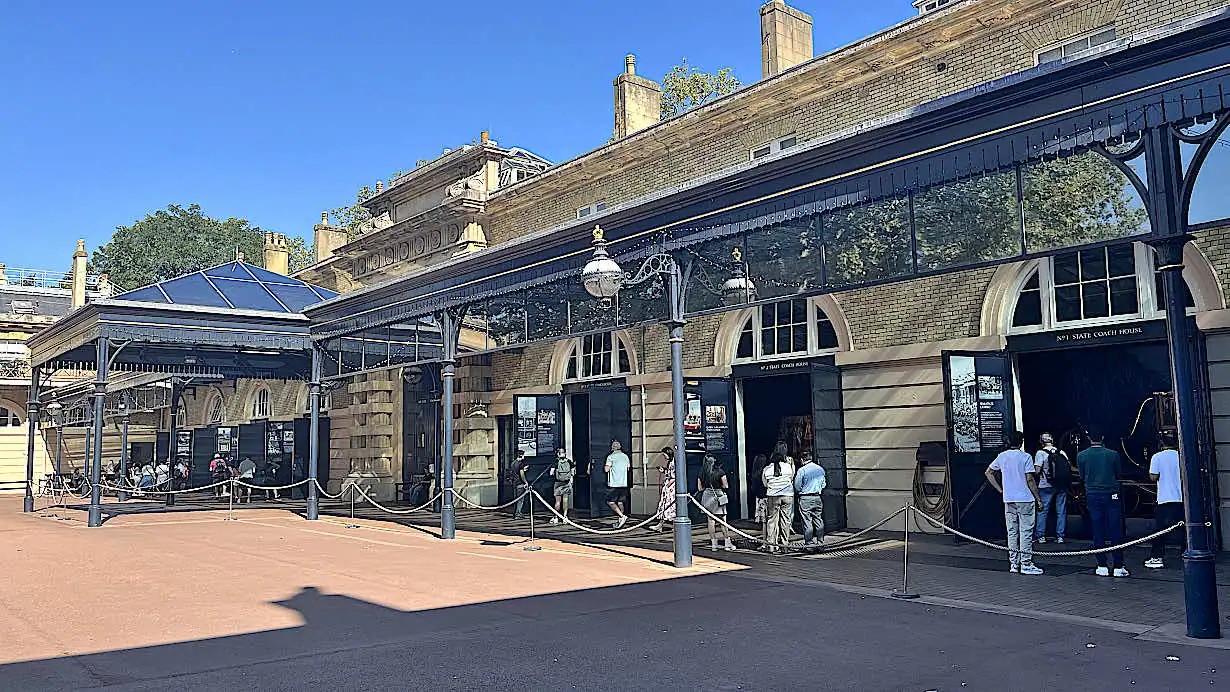 Photo: londondrum.com
Photo: londondrum.comThe carriages are kept in the stalls around the quadrangle. Pick of the bunch is the 1902 State Landau, the Glass Coach (which carries Royal brides to their weddings) and Queen Alexandra’s State Coach (which carries the Imperial Crown on State occasions). They’ve also got the Irish State Coach, Scottish State Coach and King Edward VII’s Town Coach.
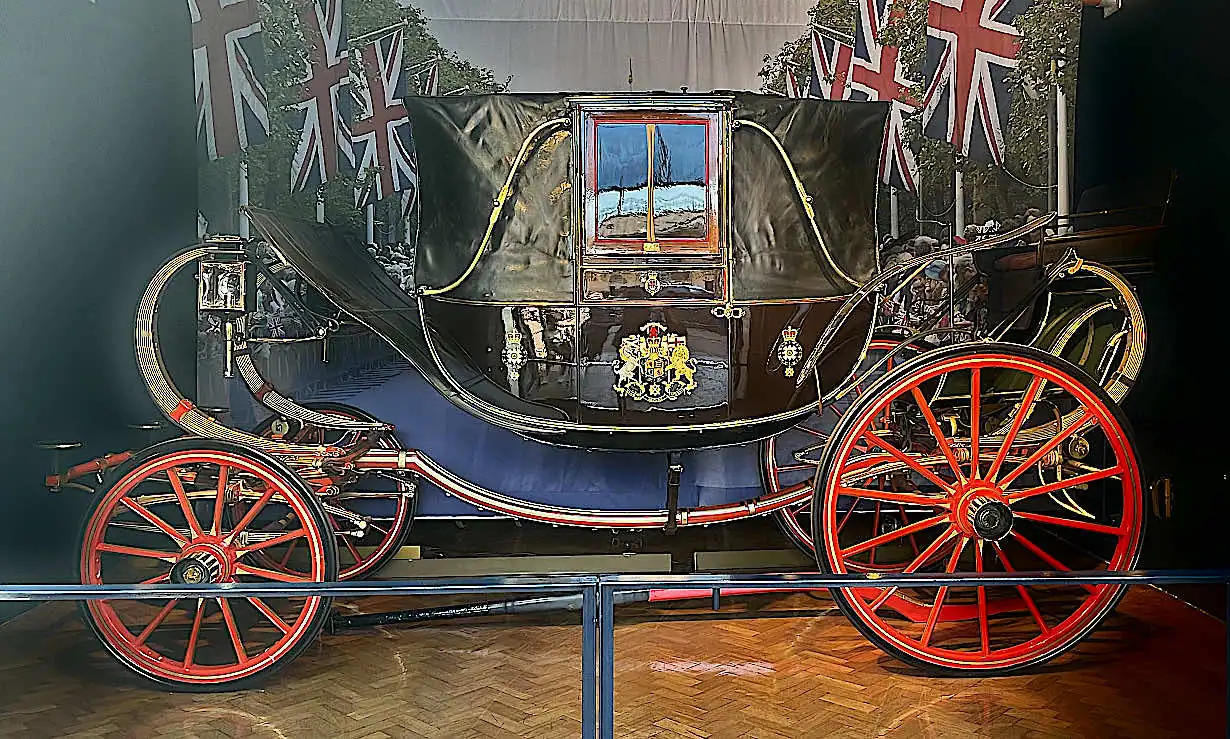 Photo: londondrum.com
Photo: londondrum.com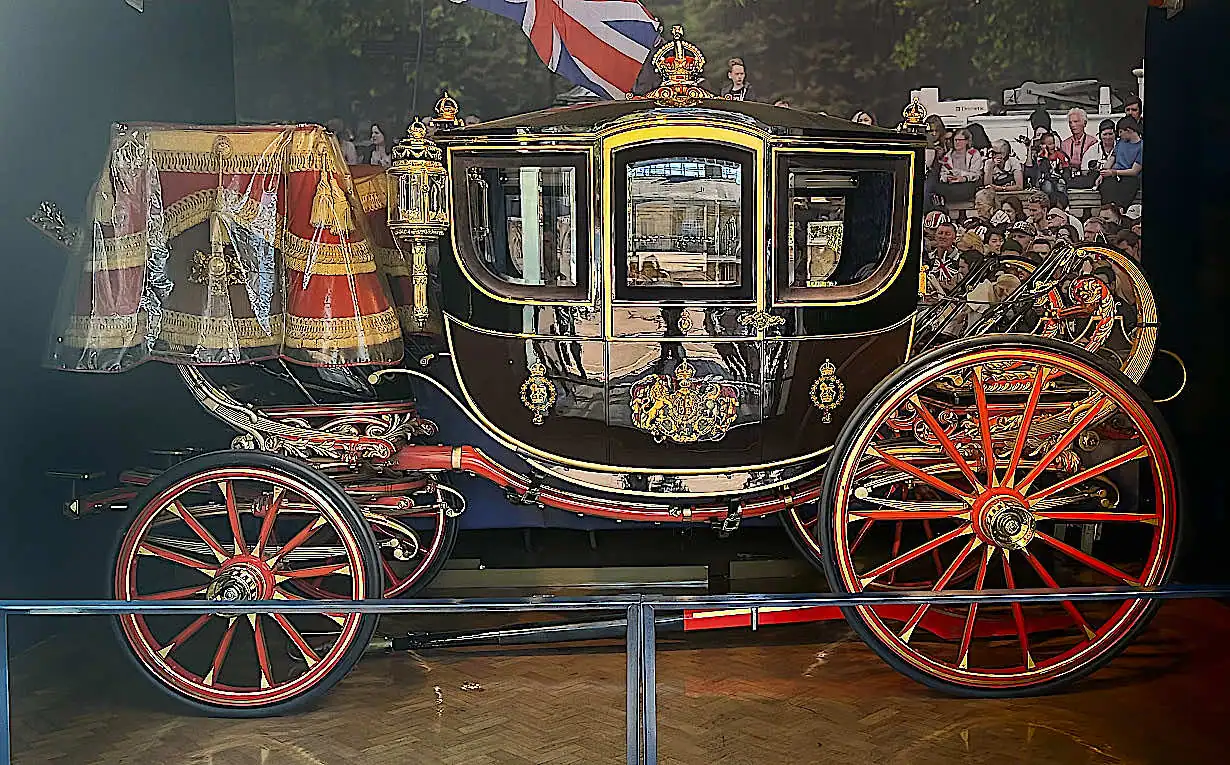 Photo: londondrum.com
Photo: londondrum.comAlso on display are a couple of sleighs, sledges, drags and charabancs, and some miniature kids carriages that are pulled by ponies, goats and dogs.
Obviously you’re not allowed to get close to any of them – you’re just peering in and seeing them from the side, but imagine how much money they could make if they tied a couple of horses to the front and allowed tourists to ride them down The Mall wearing the Crown Jewels. They could charge 20p a go. They’d make a fortune!
Australian Diamond Jubilee State Coach
Australia’s Diamond Jubilee State Coach is the first one that will really knock your socks off. The window frames and handrails are infused with slivers of wood from 100 different locations including a piece of Henry VIII’s flagship the Mary Rose, Queen Elizabeth II’s favourite boat Britannia, Balmoral, Blenheim and Kensington Palace, Canterbury Cathedral, Caernarfon Castle and Windsor, Osborne House, Holyroodhouse and Downing Street, the Tower of London, Westminster Abbey, Hampton Court and St. Paul’s.
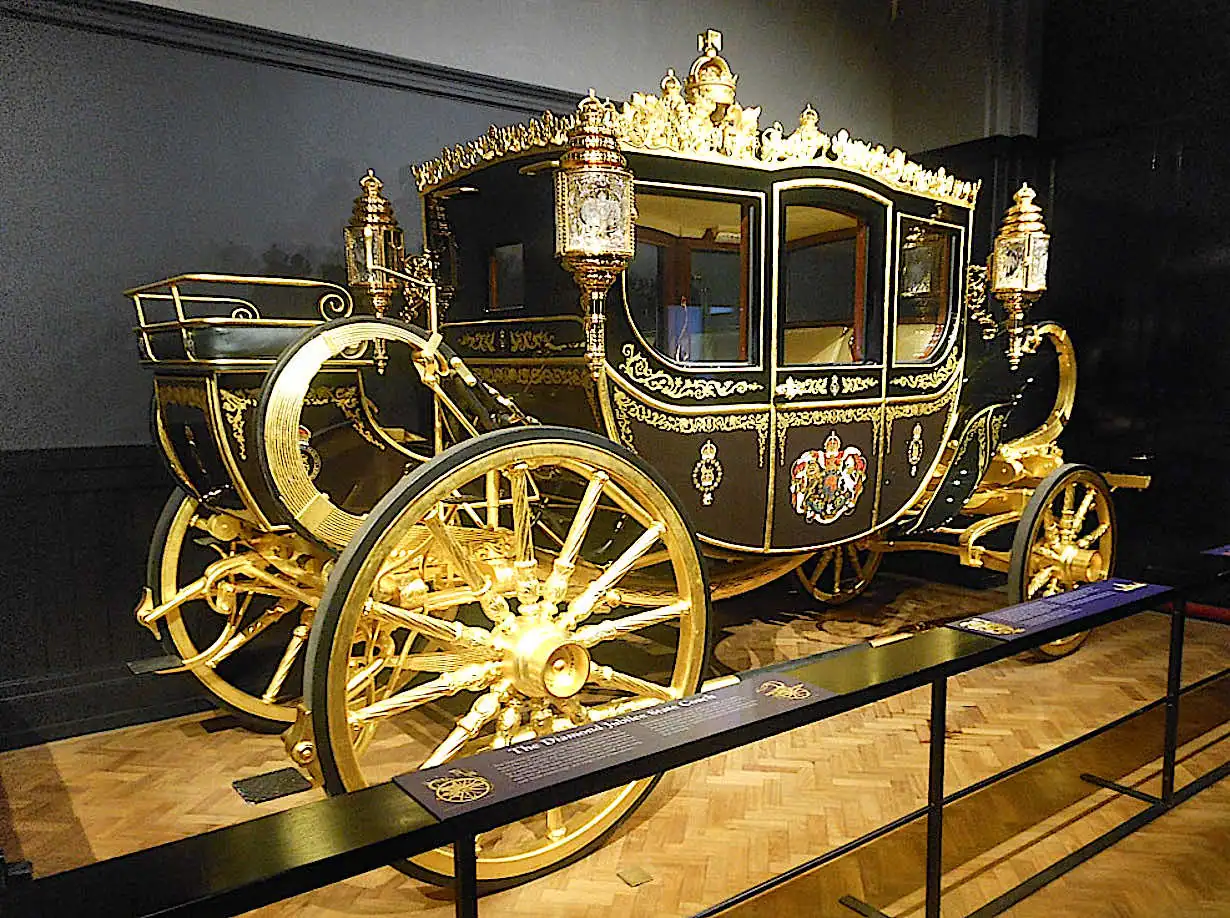 Photo: londondrum.com
Photo: londondrum.comIt even has pieces from a Dambusters Lancaster, a Battle of Britain Spitfire, and a musket ball from Wellington’s Waterloo. And the whole thing is topped off with a crown that was carved from the oak of HMS Victory. It must be the most condensed collection of historical objects in Britain.
The Gold State Coach used on Coronation Day
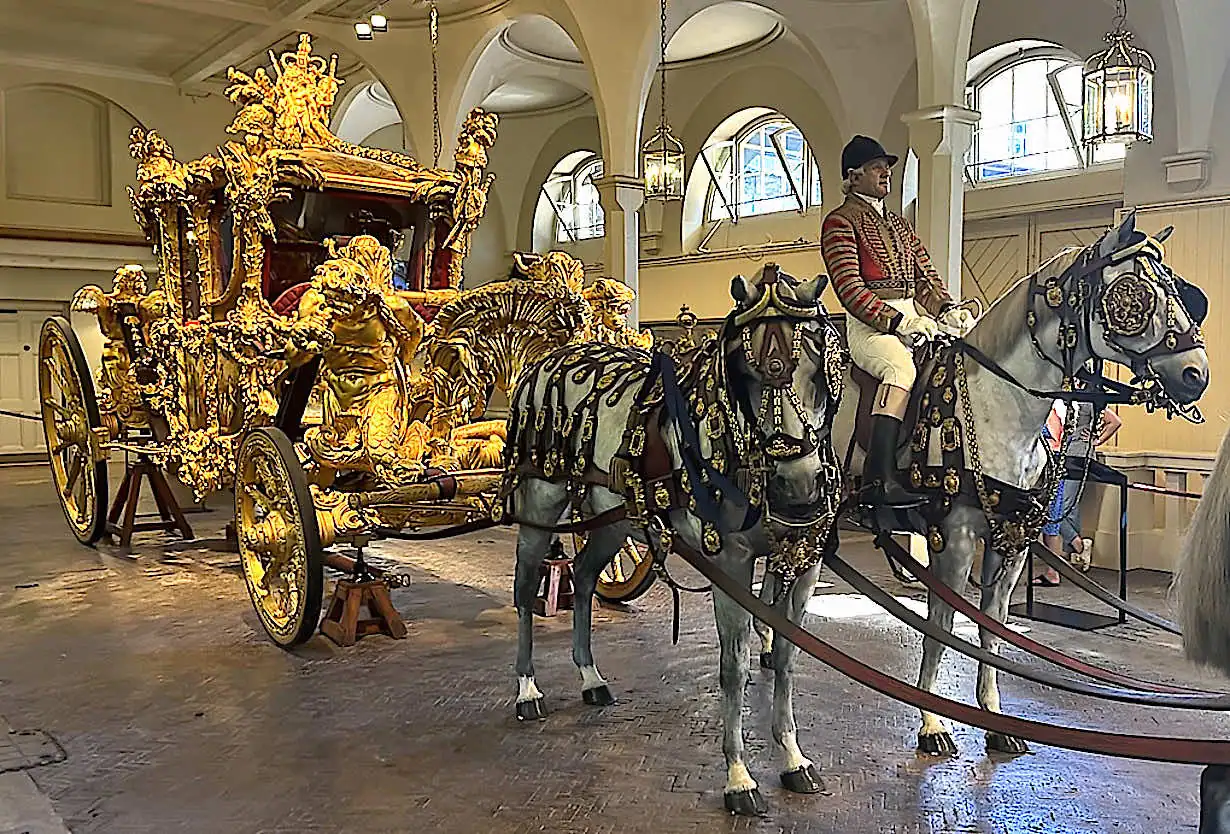 Photo: londondrum.com
Photo: londondrum.comThen comes the Gold State Coach that’s been used at every coronation since William IV. The late Queen famously complained that it’s a bumpy ride but just look at it… it’s a four-wheel fairytale with painted panels of Roman gods and goddesses, six-foot triton figures towering over the wheels, lions, laurel leaves and cherubims sitting on the roof. And the whole thing has been set dressed with four waxwork horses (eight if it was real life) and riders wearing their white wigs and finery.
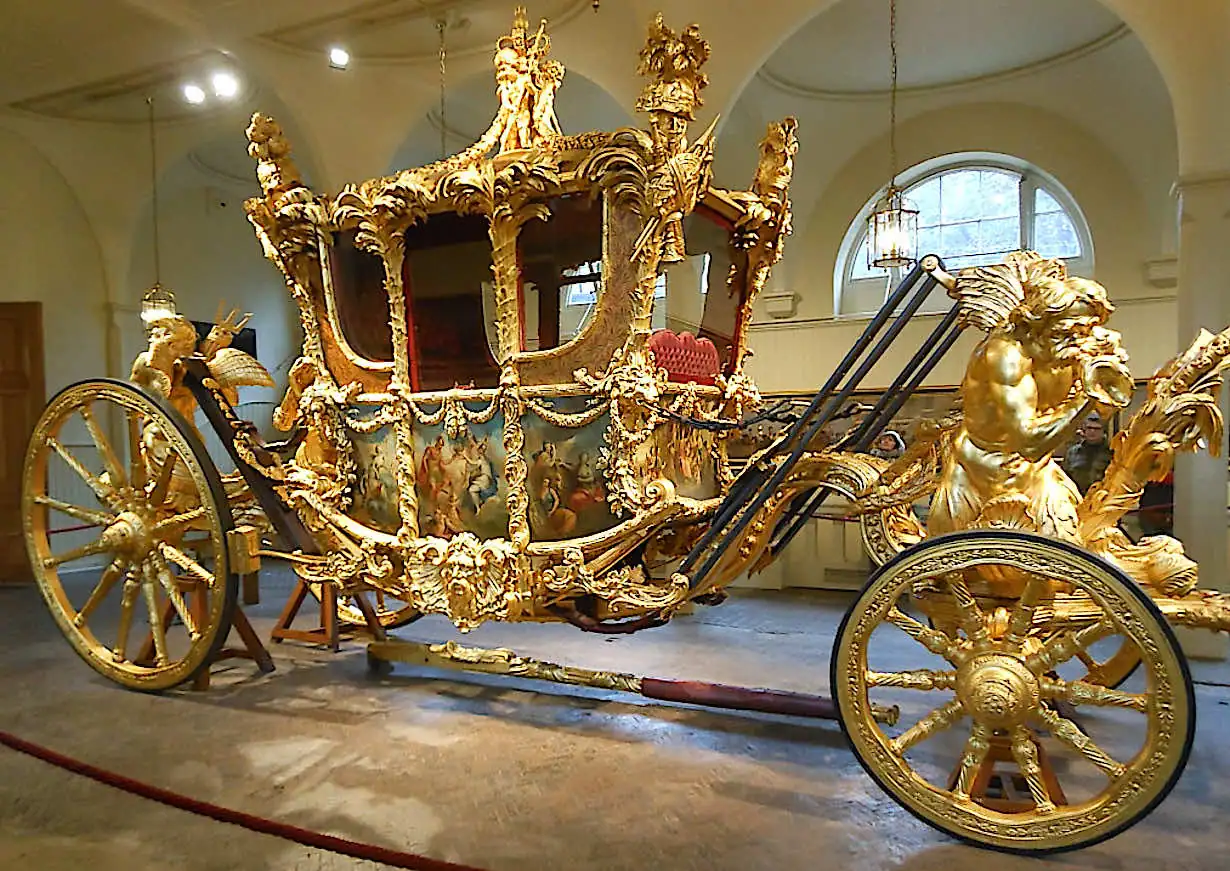 Photo: londondrum.com
Photo: londondrum.comMonarch’s State Cars & Horse Riding School
The Royal Mews is also home to the monarch’s motors, including two maroon coloured Bentley limousines, a Rolls-Royce Phantom IV, a Phantom VI, and the Queen Mother’s old Daimler Landaulet.
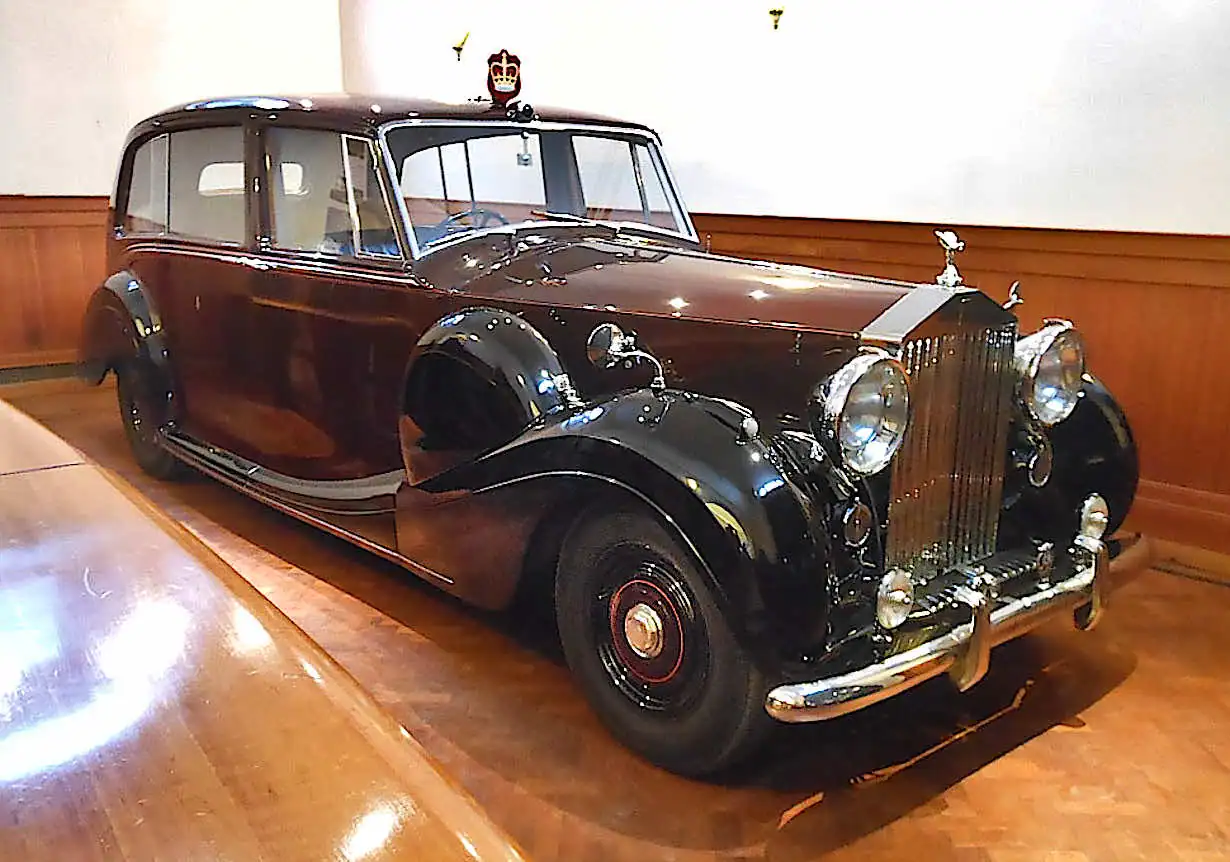 Photo: londondrum.com
Photo: londondrum.comAs you exit the building you can peer into the Riding School where the horses are trotted around a dusty parade ground, but it’s really just a quick glimpse through an open door and I’ve never once seen anyone in there.
I also recommend… If you enjoy this then try Household Cavalry Museum (walk it in 18 mins or travel from Victoria to Westminster by tube). If you want to see some of the coaches in an actual parade then you’ll have to visit Trooping the Colour or the State Opening of Parliament
How to get to the Royal Mews
| Fare zone | Cash | Oyster & Contactless | Travelcard | ||||
|---|---|---|---|---|---|---|---|
| Single fare | Single fare | Daily cap | One day | ||||
| Peak | Off-peak | Peak | Off-peak | Anytime | Off-peak | ||
| Bus (all zones) | n/a | £1.75 | £5.25 | £6 | |||
| Train (zone 1) | £7 | £2.90 | £2.80 | £8.90 | £8.90 | £16.60(zone 1-4) | £16.60(zone 1-6) |
| Train (zone 1-2) | £7 | £3.50 | £2.90 | £8.90 | £8.90 | ||
| Train (zone 1-3) | £7 | £3.80 | £3.10 | £10.50 | £10.50 | ||
| Train (zone 1-4) | £7 | £4.60 | £3.40 | £12.80 | £12.80 | ||
| Train (zone 1-5) | £7 | £5.20 | £3.60 | £15.30 | £15.30 | £23.60(zone 1-6) | |
| Train (zone 1-6) | £7 | £5.80* | £3.80* | £16.30 | £16.30 | ||
| * Journeys between zone 1 and Heathrow are always charged at the peak rate. Prices are correct as of | |||||||
Related articles and events
Search for museum exhibitions in London, museum exhibitions today, tomorrow, this weekend and during May and June, or see what’s on in Victoria
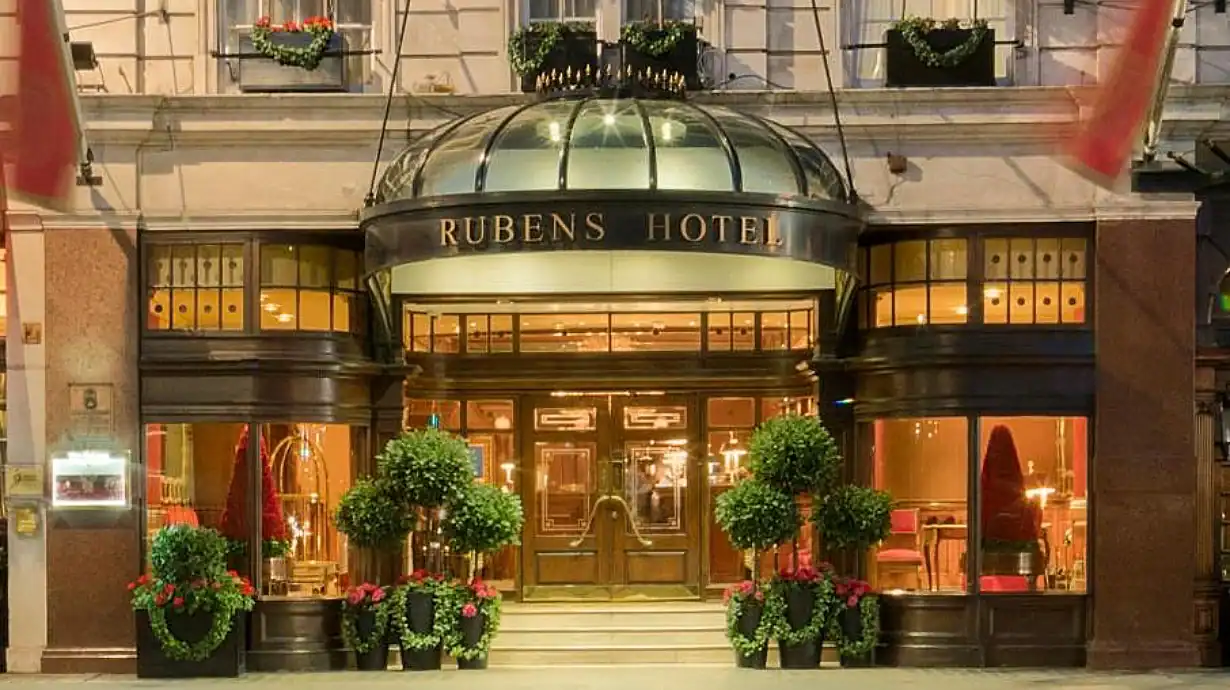
 Twitter
Twitter Facebook
Facebook Bluesky
Bluesky WhatsApp
WhatsApp Email
Email

